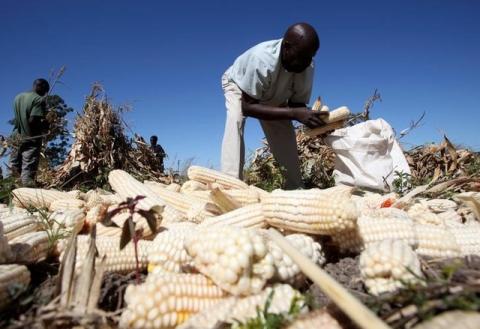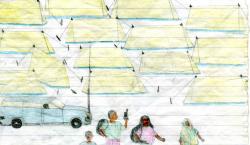Advertisement
Bumper harvest lifts Zimbabwe growth, but crisis festers: World Bank
HARARE (Reuters) - Zimbabwe's economy will grow four times faster in 2017 than last year, largely thanks to a bumper maize harvest, though fiscal imbalances continue to fuel a financial crisis, the World Bank said on Wednesday.
Growth was set to rebound to 2.7 percent from 0.7 percent in 2016, the World Bank said in an update on the economy. But it warned that underlying problems would bring that rate below the 1 percent mark again in 2018/19.
"While a good harvest is projected to boost GDP in 2017, sustaining robust long-term growth will require addressing underlying fiscal and financial sector imbalance," the bank said.
The central government’s fiscal cash deficit widened to 10 percent of GDP in 2016, up from 2.3 percent the previous year, the bank said.
"The deficit was largely financed from domestic financial markets as external arrears prevented Zimbabwe from gaining access to international capital markets. Cash shortages followed, financing for imports dried up, and the current account deficit narrowed dramatically."
Zimbabwe has struggled to feed itself since 2001 - a plight largely blamed on frequent droughts and President Robert Mugabe's seizures of white-owned farms, which hit commercial agriculture production and dented economic growth.
The World Bank said Zimbabwe was weighed down by high levels of public spending - amounting to roughly 50 percent of gross domestic product.
Harare's total debt stock would continue to grow, the bank added, putting pressure on Mugabe's government to stick to commitments to bring down fiscal deficits ahead of national elections in 2018.
The bank also said it saw 3.2 percent annual inflation rate for 2017 followed by a sharp acceleration to 9.6 percent at the end of 2018.
Ninety-three year-old Mugabe's four decade rule has been dogged by soaring consumer price growth and deep funding shortages since international institutions stopped lending to it in 1999. Zimbabwe owes more than $7 billion in arrears to foreign lenders.
Responding to the report, the country's Finance Minister Patrick Chinamasa said Harare was on track to woo back lenders by proving government's commitment to cut spending and speed up repayments on loans.
"We remain committed to the reengagement exercise (with foreign lenders) but the process has remained painfully slow. As government we remain committed to re-engage the World Bank, the International Monetary Fund and African Development Bank," said Chinamasa.
(Writing by Mfuneko Toyana; Editing by Ed Cropley and Andrew Heavens)



















Add new comment